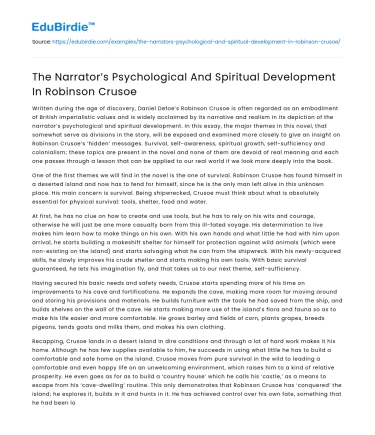Written during the age of discovery, Daniel Defoe’s Robinson Crusoe is often regarded as an embodiment of British imperialistic values and is widely acclaimed by its narrative and realism in its depiction of the narrator’s psychological and spiritual development. In this essay, the major themes in this novel, that somewhat serve as divisions in the story, will be exposed and examined more closely to give an insight on Robinson Crusoe’s ‘hidden’ messages. Survival, self-awareness, spiritual growth, self-sufficiency and colonialism; these topics are present in the novel and none of them are devoid of real meaning and each one passes through a lesson that can be applied to our real world if we look more deeply into the book.
One of the first themes we will find in the novel is the one of survival. Robinson Crusoe has found himself in a deserted island and now has to fend for himself, since he is the only man left alive in this unknown place. His main concern is survival. Being shipwrecked, Crusoe must think about what is absolutely essential for physical survival: tools, shelter, food and water.
Save your time!
We can take care of your essay
- Proper editing and formatting
- Free revision, title page, and bibliography
- Flexible prices and money-back guarantee
At first, he has no clue on how to create and use tools, but he has to rely on his wits and courage, otherwise he will just be one more casualty born from this ill-fated voyage. His determination to live makes him learn how to make things on his own. With his own hands and what little he had with him upon arrival, he starts building a makeshift shelter for himself for protection against wild animals (which were non-existing on the island) and starts salvaging what he can from the shipwreck. With his newly-acquired skills, he slowly improves his crude shelter and starts making his own tools. With basic survival guaranteed, he lets his imagination fly, and that takes us to our next theme, self-sufficiency.
Having secured his basic needs and safety needs, Crusoe starts spending more of his time on improvements to his cave and fortifications. He expands the cave, making more room for moving around and storing his provisions and materials. He builds furniture with the tools he had saved from the ship, and builds shelves on the wall of the cave. He starts making more use of the island’s flora and fauna so as to make his life easier and more comfortable. He grows barley and fields of corn, plants grapes, breeds pigeons, tends goats and milks them, and makes his own clothing.
Recapping, Crusoe lands in a desert island in dire conditions and through a lot of hard work makes it his home. Although he has few supplies available to him, he succeeds in using what little he has to build a comfortable and safe home on the island. Crusoe moves from pure survival in the wild to leading a comfortable and even happy life on an unwelcoming environment, which raises him to a kind of relative prosperity. He even goes as for as to build a ‘country house’ which he calls his ‘castle,’ as a means to escape from his ‘cave-dwelling’ routine. This only demonstrates that Robinson Crusoe has ‘conquered’ the island; he explores it, builds in it and hunts in it. He has achieved control over his own fate, something that he had been longing for before he had decided to set out into his maritime (mis-)adventures.
Moving on from self-sufficiency, we get to the theme of self-awareness. Being on the island for a long time does not make Robinson Crusoe go back to a basic life controlled by purely animal instincts. Instead, he manages to keep himself sane and, conscious of himself and his situation at all times. In fact, the time spent on the island removes him from the ‘civilized’ social world and makes him pay more attention to himself, therefore deepening his self-awareness. In the island, Crusoe learns things about himself that he probably would not have ever known had he not left home. There, he goes through a process of personal growth and maturation.
The novel’s focus on self-awareness is due to the Presbyterian doctrine that Daniel Defoe took seriously throughout all of his life, which has as one of its key points the careful reckoning of the state of one’s soul¬. We can notice Crusoe’s concern for his own state of mind in his mundane daily activities. He eagerly keeps himself in check in several ways. For example, Crusoe keeps a journal to write down every move he makes ever since he set foot on the island. It does not matter how insignificant his activities are, he records everything from simply gathering driftwood by the beach to staying inside his shelter waiting for the rain to stop. Another example is Crusoe’s makeshift calendar. One would think that the calendar’s purpose is to simply mark the passage of time and nothing else, but in reality, it serves to count the days he has spent as a castaway. In other words, it focuses on himself, it is a sort of self-conscious calendar. One last example is what Crusoe teaches his parrot: “Poor Robin Crusoe… Where have you been?” This sentence alone confirms his need for staying aware of himself.






 Stuck on your essay?
Stuck on your essay?

